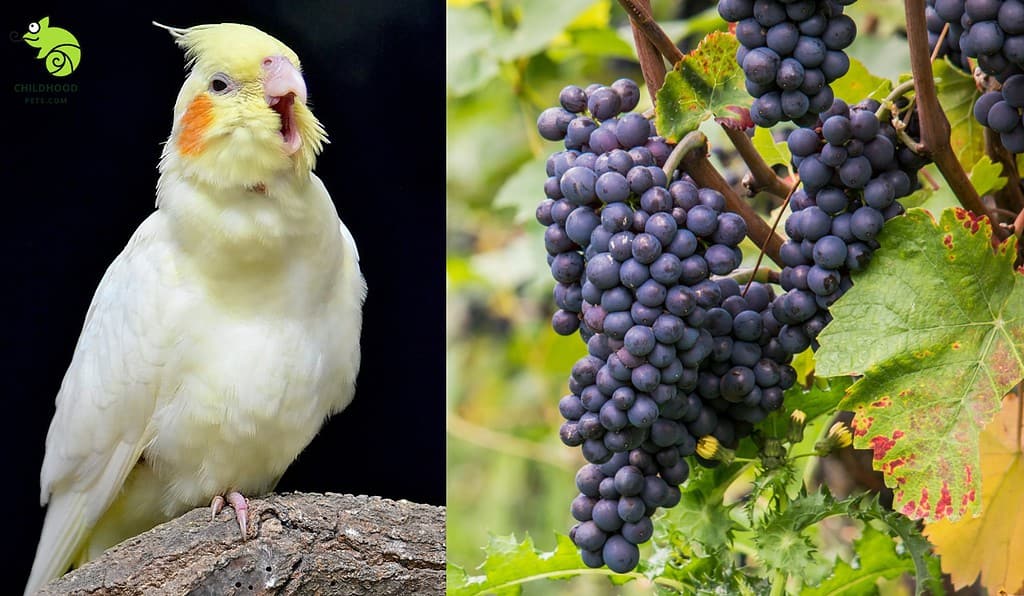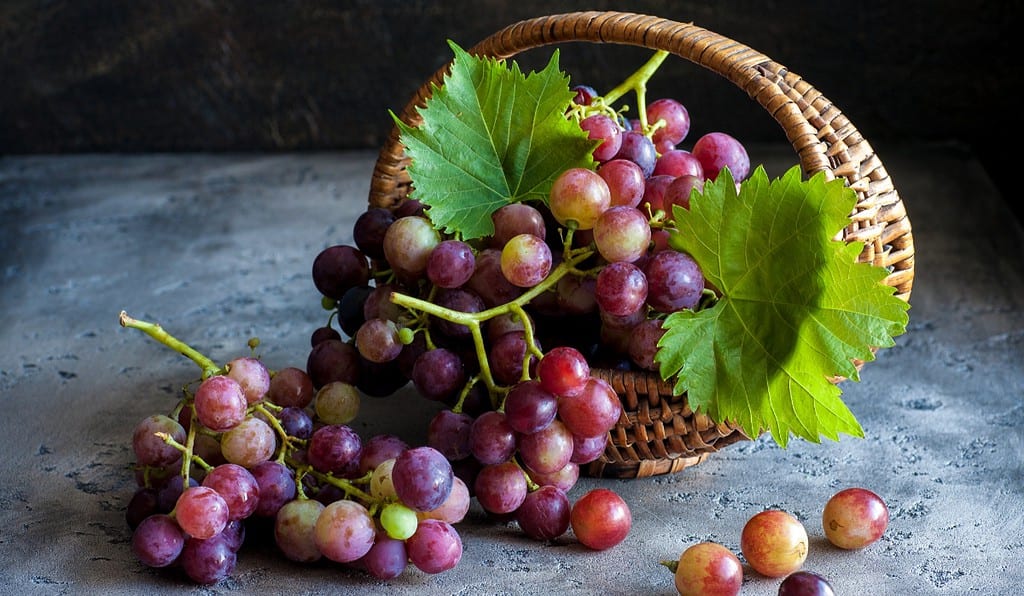
Ever caught your cockatiel eyeing your snack with that unmistakable glint of curiosity? It’s a sight many bird lovers can relate to, especially when munching on something as juicy and tantalizing as grapes. But the question that often follows is, can our feathered friends safely indulge in this fruity delight?
As a general rule, cockatiels can safely eat grapes. Both seeded and seedless varieties are non-toxic to these birds. In total, offering them a small piece of grape, once or twice a week is ideal. However, it’s crucial to ensure they’re prepared correctly to avoid any potential risks.
Ready to unravel the mysteries of cockatiels and grapes? Stick around as we delve deeper into what’s safe, what’s not, and how to make snack time a treat for both you and your birdie buddy!
The Natural Diet of Cockatiels
Out in the wild, cockatiels have a pretty diverse menu. They’re not just nibbling on seeds all day; they’re foraging for a variety of foods that keep them chirpy and healthy. Understanding their natural diet can help us offer them the best at home. After all, a balanced diet is just as crucial for our winged pals as it is for us.
1. Seeds and Grains: The staple of a cockatiel’s diet. Whether it’s millet, sunflower seeds, or canary seeds, these little guys love them. But remember, while seeds are essential, they shouldn’t be the only thing on the menu.
2. Fruits and Berries: Cockatiels enjoy a sweet treat now and then. Fruits like apples, berries, and yes, even grapes, can be a delightful addition to their diet.
3. Leafy Greens: Think of them as the salad lovers of the bird world. Spinach, kale, and lettuce are some of their favorites. It’s a great way to ensure they get their vitamins and minerals.
4. Insects and Their Larvae: A little protein boost! In the wild, cockatiels occasionally snack on insects. While it might not be everyone’s cup of tea, it’s a natural part of their diet.
5. Flowers and Buds: These add variety and a touch of gourmet to a cockatiel’s diet. Flowers like hibiscus and dandelions are not only safe but also quite loved by these birds.
You see, just like us, cockatiels thrive on a varied diet. So, next time you’re preparing a meal, think about how you can share a bit with your feathery companion. But, let’s get back to the grapey question at hand, shall we?
Can Cockatiels Safely Eat Grapes?
Absolutely! Grapes are a delightful treat for our cockatiel buddies. I’ve treated countless cockatiels in my years as a vet, and I can confidently say that grapes aren’t harmful to them. Whether you’ve got a bunch of seeded or seedless grapes, both are okay. But, as with everything, moderation is key.
Now, you might be wondering, “Why even give my cockatiel grapes?” Well, aside from the sheer joy of watching them nibble on these juicy morsels, grapes pack a nutritional punch.
Essential Nutrients in Grapes
| Nutrient | Amount in 100g of Green Grapes | Benefits for Cockatiels |
| Vitamin A | 66 IU | Supports vision and immune health |
| Vitamin C | 3.2 mg | Boosts immunity and aids healing |
| Vitamin K | 14.6 µg | Helps in blood clotting |
| Vitamin B6 | 0.086 mg | Supports nervous system health |
| Potassium | 191 mg | Maintains heart and muscle function |
| Manganese | 0.1 mg | Aids in bone formation and metabolism |
| Phosphorous | 20 mg | Helps in forming bones and teeth |
| Iron | 0.36 mg | Essential for blood formation |
| Calcium | 10 mg | Vital for bone health |
| Fiber | 0.9 gram | Aids digestion |
| Sugar | 15.5 gram | Provides energy |
| Antioxidants | Present | Protects cells from damage |
These nutrients not only keep your cockatiel in tip-top shape but also add a burst of flavor to their diet. Imagine the joy of tasting something new and realizing it’s also good for you! That’s precisely what your cockatiel feels.
However, while grapes are a treat, they’re not without their risks. Before you rush off to share your grape stash, let’s chat about some precautions. After all, as much as we love treating our pets, their safety always comes first.
Risks Associated with Grapes
Now, don’t get me wrong. While grapes are generally safe, there are a few things you should be mindful of. Just like how we need to be cautious with certain foods, our feathered friends do too.
- High Sugar Content: Grapes, as delicious as they are, come with a natural sugar content. Too many grapes can lead to obesity and other health issues in cockatiels. Remember, moderation is key.
- Potential Choking Hazards: Especially with larger grapes or those with seeds. Even if the seeds aren’t toxic, they can pose a choking risk. Always be on the safe side and monitor your bird when they’re enjoying their treat.
- Pesticides and Chemicals: Grapes can sometimes be treated with pesticides. These chemicals are harmful to birds. Always ensure you wash grapes thoroughly before serving them to your cockatiel.
Steps for Properly Washing and Preparing Grapes for Cockatiels:
- 1. Choose organic grapes if possible. They’re less likely to have harmful chemicals.
- 2. Rinse the grapes under cold running water. This helps in removing any surface dirt or contaminants.
- 3. For an extra thorough clean, soak the grapes in a mixture of water and a bit of vinegar for about 5-10 minutes. This can help in removing any lingering pesticides.
- 4. Rinse again with cold water.
- 5. Pat them dry with a clean cloth or paper towel.
How to Serve Grapes to Cockatiels

Alright, now that we’ve covered the basics, let’s get to the fun part – serving grapes to your cockatiel!
1. Serving Size and Frequency: A grape or two once in a while is more than enough. Think of it as a treat, not a regular meal.
2. Preparing Grapes: Always ensure they’re washed (as we discussed), cut into manageable pieces, and seedless. This minimizes any choking risk.
3. Introducing Grapes: If it’s the first time your cockatiel is trying grapes, start with a tiny piece. Monitor their reaction. Some birds might be hesitant at first, but with time, they’ll come to love it.
4. Mix it Up: Once you know your cockatiel enjoys grapes, consider mixing them with other safe fruits for a fruity feast.
5. Observe and Adjust: Always keep an eye on your bird after introducing any new food. If you notice any unusual behavior or digestive issues, it might be best to consult with a vet.
Remember, every cockatiel is unique. What works for one might not work for another. It’s all about understanding your bird’s preferences and needs. And trust me, when you see your cockatiel happily nibbling on a grape, all this effort will feel worth it!
How Much (And How Often) Should You Give Grapes To Your Bird?
When it comes to treating our feathered friends, it’s easy to get carried away. I mean, who can resist those eager eyes and chirpy requests? But, as with all treats, there’s a balance to strike.
For cockatiels, grapes should be seen as a treat rather than a regular dietary staple. Think of them as the equivalent of us indulging in a piece of chocolate or a slice of cake. Delicious, yes, but not something we’d have every day.
A good rule of thumb is to offer your cockatiel a small piece of grape, about the size of a pea, once or twice a week. This ensures they get the joy and nutritional benefits of the grape without overdoing it.
Other Fruits and Foods for Cockatiels
Variety is the spice of life, and the same goes for our cockatiels. While grapes are a fantastic treat, there’s a whole world of fruits out there for them to explore.
| Safe Fruits for Cockatiels | Benefits | Fruits to Avoid | Potential Risks |
| Apples (seedless) | Rich in fiber and vitamins | Avocado | Contains persin, toxic to birds |
| Bananas | Good source of potassium | Fruit pits and seeds | Choking hazard or potential toxins |
| Berries (blueberries, strawberries) | Antioxidants | Onions | Can cause digestive issues |
| Mangoes | High in Vitamin A | Chocolate | Toxic and can be fatal |
| Papaya | Enzymes aid digestion | Alcohol | Harmful and can be fatal |
Remember, the key is moderation and variety. By offering different safe fruits, you’re ensuring your cockatiel gets a range of nutrients. Always introduce new fruits slowly and in small amounts, observing your bird for any adverse reactions.
Frequently Asked Questions
Are grape seeds poisonous for cockatoos?
Grape seeds are generally harmless for most birds, including cockatoos.
Can cockatiels eat uncut grapes?
While possible, it’s recommended to cut grapes to avoid potential choking hazards.
Is it safe for Cockatiels to eat grape stems?
Grape stems are safe in insignificant amounts but not a primary food source.
Final Thoughts
Caring for our feathered companions is a journey filled with learning, laughter, and love. Understanding their dietary needs and preferences is a crucial part of this journey. Grapes, when given in moderation, can be a delightful treat for your cockatiel. But always remember to prioritize their safety and well-being.
I hope this guide has shed some light on the grapey question. If you’ve found this helpful, I’d love to hear about your experiences. And hey, if you think this could benefit another bird lover out there, don’t hesitate to share. Here’s to many more chirpy days with your cockatiel! 🍇🐦
